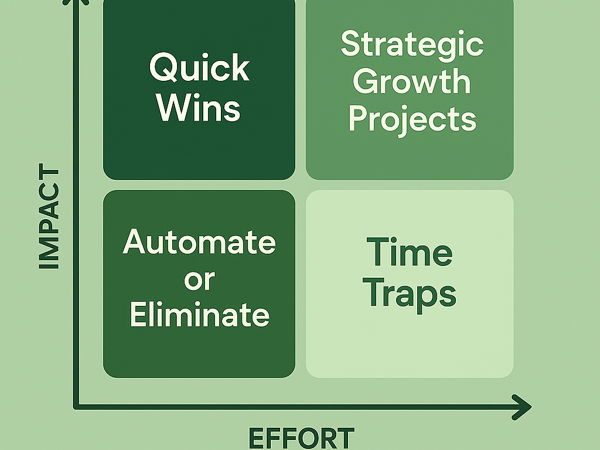Create Financial Clarity Through Simplicity
Managing finances as a real estate agent or self-employed professional can feel overwhelming. Between irregular income, fluctuating expenses, and the day-to-day demands of running a business, financial planning often falls to the bottom of the to-do list. But clarity in your finances doesn’t require complexity. In fact, simplicity is one of the most powerful tools for building financial confidence and long-term success. By establishing simple financial habits now, you create a strong foundation that will serve you as your business and wealth grow. Let’s explore how to build financial clarity through simplicity—and why, as life becomes more complex, working with a professional can help you elevate your financial plan.
The Power of Delegation: Freeing Up Time to Focus on Growth
If you're self-employed or a real estate professional, you're no stranger to long days and full calendars. But not all tasks are created equal—and not all of them deserve your time. To build a more efficient business, one of the most powerful strategies is delegation. But before you can delegate, you need clarity on what’s actually worth your time. That’s where the Effort-Impact Matrix comes in.This simple but strategic framework helps you audit your practice and determine where you should focus, what you can delegate, and what you can automate.
Financial Planning for Real Estate Agents & the Self-Employed: A Practical Guide
If you’re a real estate agent or self-employed, you already know: your financial world doesn’t look like your salaried friends’. Your income ebbs and flows. Your taxes aren’t automatically withheld. Your business and personal expenses often overlap. And yet, your income potential is unlimited—if you can manage your money well. That’s what this guide is about: creating a financial plan that fits your unique lifestyle and helps you build the future you want.
Post-Tax Season Reset: A Realtor’s Guide to Mastering Quarterly Tax Payments
As the dust settles from tax season, most people take a well-earned break from thinking about the IRS. But for real estate professionals, now is actually the best time to focus on taxes—specifically, how to get caught up and stay ahead on your quarterly estimated payments. If this year's tax prep felt more chaotic than it should have, you're not alone. Many agents are so busy closing deals and managing client relationships that tax planning gets pushed to the back burner—until it’s too late. This post-tax season window is a golden opportunity to reset and implement a smoother strategy moving forward.
How Market Volatility Can Be an Opportunity for Long-Term Investors
Market volatility can feel unsettling—especially when your income already fluctuates, like it often does for self-employed professionals and realtors. But here’s the good news: volatility isn’t always a threat. In fact, for those with a long-term investment horizon, it can be one of your greatest advantages.
Navigating the Emotional Side of Financial Planning: Overcoming Money Mindset Challenges
When it comes to financial planning, most people focus on the numbers—income, expenses, investments, and taxes. But what often gets overlooked is the emotional side of money. Your mindset plays a huge role in how you manage your finances, especially if you're self-employed. Real estate professionals, entrepreneurs, and freelancers often face financial uncertainty, making it even more important to develop a healthy relationship with money. In this article, we’ll explore common money mindset challenges self-employed professionals face and provide strategies to overcome them, helping you build confidence and long-term financial success.






